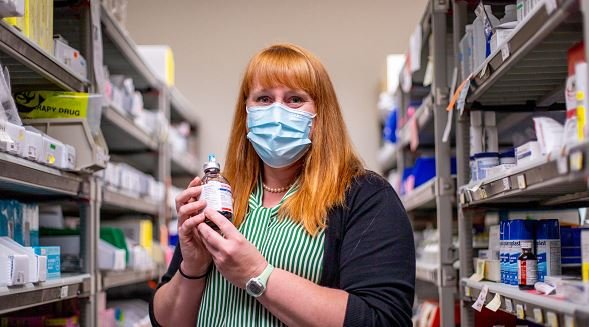
Liz Laubach had an unconventional path toward becoming a pharmacist. Read more about how she ended up finding a career she loves.
Liz shares her path toward becoming a pharmacist
Liz Laubach, PharmD, BCPS, was a member of Concordia University Wisconsin School of Pharmacy’s first graduating class. Currently, Liz serves as Associate Professor of Pharmaceutical Science with her site at the Wisconsin Poison Center. Liz was the Regional Director of Pharmacy for Ascension in the North Milwaukee area. Liz’s path toward becoming a pharmacist wasn’t exactly straightforward. Below, she shares a little more about how she ended up doing a job that she loves.
You’re a second-career pharmacist. What did you do prior to pharmacy school?
I like to say I took the long and winding road to pharmacy. I’m originally from upstate NY and as I was completing my Bachelor’s at Cornell University, I didn’t have a clear idea of what I wanted to do with my life. I liked the idea of medicine but I didn’t know where I belonged. Upon graduating I got a job teaching math at an inner-city high school and I became an EMT to get exposure to the medical field. For several years I would teach during the week and then practice as an EMT on weekends, holidays, and summers. I even spent a few summers working at an emergency/referral veterinary clinic when I thought that might be a direction I’d want to go.
What made you consider changing careers?
First of all, my exposure to pharmacy occurred through my EMT experiences in seeing a variety of healthcare providers in different practice settings. It was the first time I encountered pharmacists outside of the community setting. My own curiosity in the medications I was working with as an EMT furthered this interest. The pharmacy profession appealed to my analytical mind and gave me the opportunity to use my teaching skills. Also, I appreciated that there are a multitude of opportunities within the field of pharmacy.
I chose Concordia because of the positive interview experience and their approach to experiential education. Having been through a variety of experiential education situations as an EMT, I was looking for a school where the experiential education component was highly valued.
Since graduating from pharmacy school, what roles and responsibilities have you had?
I graduated as part of the Genesis Class in 2014. Since then I have worked as a…
- Staff pharmacist in both hospital and community settings
- Specialist in Poison Information at the Wisconsin Poison Center
- Pharmacy Manager in a community hospital
- Regional Director of Pharmacy in a multi-hospital system
What has been the most interesting work you’ve been able to do as a pharmacist?
I don’t know if I can pick one! One of things I love about my field is that every day is different and there is opportunity in every environment. My clinical passion is in the field of toxicology and I’m continually fascinated by how the mechanism of action of a medication can cause benefit in one instance and poisoning in another. I enjoy bringing drug expertise to the world of emergency preparedness and have had the opportunity to train with FEMA and the Department of Homeland Security. I’m also a member of the State of Wisconsin’s Disaster Medical Advisory Council’s Subcommittee on Therapeutics where we tackle medication utilization in the COVID-19 response effort.
What has been your favorite thing about being a pharmacist?
Problem solving! While somedays it can feel like a game of Clue or like you’re putting together a puzzle without corner pieces, you are equipped to handle almost anything. It’s incredibly rewarding when you can positively impact someone’s life.
What do you most look forward to in your new role as a professor?
Working with students! I’m excited to share my passion for pharmacy and toxicology and there is nothing like teaching as its own learning experience. I’m looking forward to all the ways I’m challenged to consider something differently or try a new approach to help improve student learning.
What advice do you have for future pharmacists, either studying in pharmacy school, or considering pharmacy school?
- Stay adaptable. Whether its pursuing rotations or jobs, reinventing your career, or working with unique situations, the future of healthcare belongs to those who can adapt to change.
- Say yes! Embracing your interests and new professional opportunities will only increase your job satisfaction.
Do you want to know more?
If you’re feeling inspired by Liz’s story, you can reach out to our admissions counselor, Nalee Vang. She’s ready to help you learn more about what pharmacy school could look like for you.
—
If this story has inspired you, why not explore how you can help further Concordia's mission through giving.